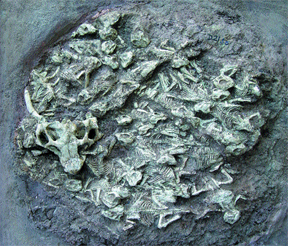 In early
2003, a farmer in Liaoning, China, spotted an unusual fossil deposit in the
Yixian Formation. It turned out to be a mass grave of a small plant-eating adult
dinosaur and 34 babies. Now, paleontologists say that the fossils may represent
parental behavior and a possible evolutionary link to the devotion of modern
birds and crocodilians to their young.
In early
2003, a farmer in Liaoning, China, spotted an unusual fossil deposit in the
Yixian Formation. It turned out to be a mass grave of a small plant-eating adult
dinosaur and 34 babies. Now, paleontologists say that the fossils may represent
parental behavior and a possible evolutionary link to the devotion of modern
birds and crocodilians to their young. An adult Psittacosaurus and 34 associated juveniles found in the Yixian Formation of Liaoning, China, may be evidence of parental care by dinosaurs. Courtesy of Liu Jinyuan and the Dalian Natural History Museum.
Currently housed at the Dalian Natural History Museum in China, the fossil consists of 34 whole juvenile Psittacosaurus skeletons, all of similar size, with front and hind limbs situated in lifelike poses, as described by Qingjin Meng and colleagues in the Sept. 9 Nature. The adult, although cut off from the waist down, also rests in a lifelike position with its head slightly raised. The close association of the adult to the young implies post-hatching parental care, the authors wrote, and the lack of weathering or scavenging by other animals suggests that the dinosaurs were buried alive.
Until now, determining the parental behavior of dinosaurs has been largely speculative. A discovery such as this is quite rare, says Mark Norell, a curator at the American Museum of Natural History. But under special sedimentary circumstances, he says, “it’s possible to find fossil behaviors preserved.”
Jack Horner of Montana State University, who has made previous interpretations of parental care in the “duck-billed” dinosaur Maiasaura, says that he suspects “we will one day find similar behavior common to most dinosaur taxa.”
The Lower Cretaceous Yixian Formation is famous for its well-preserved feathered dinosaurs and birds. The unique sedimentary environment, Norell says, promises to shed more light on dinosaur behavior in the near future.
Laura Stafford
Back to top

